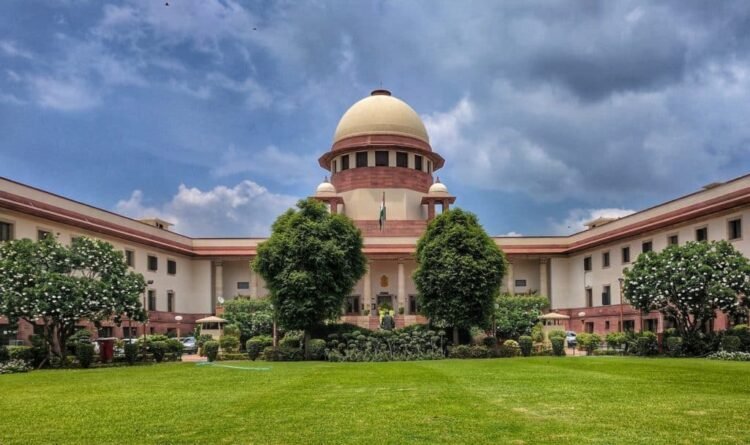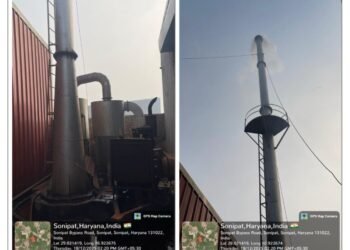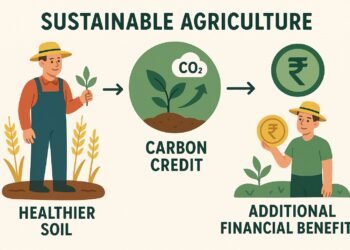Supreme Court Warns Authorities Over Rising Air Pollution
Miffed over the inaction of central and state authorities on the rising air pollution in Delhi-NCR caused by stubble burning, the Supreme Court on Wednesday said that the right to live in a “pollution-free environment” is a “fundamental right”.
Synopsis
The Supreme Court of India has expressed strong displeasure over the inaction of central and state authorities regarding the rising air pollution in Delhi-NCR, mainly caused by stubble burning. The Court emphasized that the right to live in a pollution-free environment is fundamental under Article 21. The bench criticized both the central and state governments, as well as the Commission for Air Quality Management (CAQM), for their failure to enforce penalties and compliance. The top court also directed the Centre to amend laws to strengthen environmental compensation levied on violators, aiming to protect citizens’ rights to a clean environment.
Displeasure with Lack of Action Against Violators
A bench comprising justices Abhay Oka, Ahsanuddin Amanullah, and Augustine George Masih expressed its strong displeasure over inaction by the Centre against violators and errant state officials who have failed to proceed against those indulging in stubble burning.
“Time has come to remind the government of India and state governments that there is a fundamental right vesting in every citizen under Article 21 of the constitution of India to live in a pollution-free environment. These are not the matters only of implementing the existing laws. These are the matters of blatant violation of fundamental rights guaranteed under Article 21 of the constitution of India,” stated a bench of Justices A. S. Oka, Ahsanuddin Amanullah, and Augustine George Masih during a hearing on stubble burning in Punjab and Haryana.
The bench further noted that while the unamended Section 15 of the Act classified violations as penal offences, the amended section, effective from April 1, replaced this with a provision for recovery of penalties for contravention of the Act’s provisions.
*****
Failure to Enforce Penal Actions
The SC observed that it was prima facie clear that the Centre was not taking any penal action against the violators. The bench said that time has come to remind the central and state governments of Punjab and Haryana that “there is a fundamental right subsisting with the citizens to live in a pollution-free environment. These are matters of blatant violation of fundamental rights under Article 21 (right to life and liberty)”.
However, “the provision has been rendered completely ineffective due to inaction on the part of the government of India,” it stated, adding, “no rules have been framed to support this provision, nor have adjudicating officers been appointed, despite more than six months having passed. Without the appointment of adjudicating officers under Section 15(c), it is clear that law enforcement agencies cannot impose penalties under Section 15.”
*****
Government Accountability for Citizens’ Rights
The top court added that the “government has to answer itself as to how it is going to protect the citizens’ right to live with dignity and a pollution-free environment”. The bench clarified that it is “not an adversarial litigation” and its sole purpose is to “ensure that citizens’ rights to live with dignity and clean environment are upheld”.
CAQM Defying Supreme Court Orders
The SC also cornered the Commission for Air Quality Management (CAQM) for defying its orders for the past three years. “What action has been taken by you under Section 14 against erring officials? We will take the Union of India to task as they submit that Section 15 which provides for penalty has been amended. You don’t have the adjudicating officer to enforce it. The Environmental Protection Act, 1986, has been made toothless,” the bench told the counsel for the commission.
The court said that “in absence of machinery created by the government of India, Section 15 as amended has become toothless. And there is nothing in the hands of law enforcing authorities to strictly enforce the provisions of Environment Protection Act. Therefore, those who violate the laws related to environment are now scot free as no action can be taken against them”.
The SC recorded the statement of the Centre’s counsel that “within 2 weeks, entire machinery will be in existence”.
*****
Justice Oka Criticizes Political Influences
Speaking for the bench, Justice Oka verbally observed: “Don’t bail out these people. We are telling you very seriously. If these governments and you were seriously ready to safeguard the environment, then everything would have been done before amendment to Section 15.” Mincing no words, Justice Oka said that “this is all political, nothing else”.
Nominal Fines for Stubble Burning
As ordered at the last hearing, the chief secretaries of Punjab and Haryana were present in SC. The top court hauled up the Punjab government for collecting nominal fines (Rs. 2,500 each) from errant farmers. The counsel for the Punjab government informed the bench that the said fine was fixed by CAQM. Unimpressed, SC observed that letting violators off by paying such a nominal fee was tantamount to “giving licence” to violators.
Pulling up Punjab and Haryana over their “inaction” to implement the directions of the Committee for Air Quality Management and failure to prosecute those who continued to indulge in stubble burning which was contributing to air pollution in Delhi and National Capital Region areas, the court had on October 16 asked their Chief Secretaries to appear before it.
*****
SC Criticizes Leniency Toward Violators
“That’s incredible. How much less amount? We will tell you very frankly that you are giving a signal to violators that nothing will be done against them. This has been happening for the past three years,” the bench added.
Selective Enforcement in Punjab and Haryana
The top court also lambasted the states of Punjab and Haryana for being “selective” as to whom it was collecting compensation from and registering criminal cases against for contributing to air pollution. Questioning the states for “cherry picking” the violators, Justice Oka further verbally asked: “Is there some policy designed by you where you select a few for compensation and a few for prosecution?” He added that “there needs to be reconsideration of compensation.”
The SC recorded the statement of the Centre’s counsel that “within 2 weeks, entire machinery will be in existence”.
*****
States’ Inaction on Pollution Violations
When the top court was informed by the state counsels that the number of violations has come down, the bench retorted that the numbers are reducing because the states are not taking action. “Don’t be happy about it,” Justice Amanullah added.
Directives to Amend Environmental Compensation Law
The apex court directed the Centre to amend the law so as to increase the environmental compensation cess levied on farmers who indulge in stubble burning and errant officials who fail to act on the same. The bench said that at the next hearing it would look into the issues limited to pollution in Delhi caused by transport vehicles, industries, and open burning of garbage.
Wednesday, the court said that the Haryana Chief Secretary had claimed that the instances of stubble burning have been reduced considerably. “However, in case of both the governments, we find that selective action is being taken,” the bench said. The court will hear it next on November 4.
*****
Key Facts
| Fundamental Right to Pollution-Free Life | Supreme Court stressed that under Article 21, citizens have the right to a pollution-free environment. |
| Amended Section 15 Weakens Enforcement | April 1 amendment to Section 15 shifted from penal offense to penalty recovery, limiting strict enforcement of the Act. |
| Provision Lacks Support Mechanism | Supreme Court noted lack of rules and adjudicating officers makes enforcement under Section 15 ineffective. |
| Inaction from Government | The Court criticized the Centre for failing to establish required machinery to support the amended Environment Act. |
| “Toothless” Law Without Machinery | Due to no enforcement setup, Section 15 cannot be fully effective, leaving law enforcers powerless to impose penalties. |
| Citizens’ Rights Violated | Supreme Court warned that failure to implement environmental laws violates citizens’ fundamental rights. |
| Centre’s Commitment | The Centre’s counsel assured that machinery for enforcing Section 15 would be operational within two weeks. |
| Concerns on Stubble Burning | Supreme Court highlighted stubble burning’s contribution to air pollution in Delhi-NCR, blaming Punjab and Haryana’s inaction. |
| Selective Action by States | Court observed both Punjab and Haryana have inconsistently enforced stubble burning laws, selectively taking action. |
| Next Hearing Scheduled | The case will be revisited on November 4 to assess the governments’ compliance with pollution control mandates. |
You Learn
On Wednesday, the Supreme Court emphasized that it is time to remind governments that citizens hold a fundamental right under Article 21 to live in a pollution-free environment. The Court noted that the amended Section 15 of the Environment Protection Act of 1986, which outlines penalties for violations, has been rendered “toothless” due to the Centre’s failure to establish the necessary enforcement mechanisms.
Also Read
Environment Protection under Constitutional Framework of India I India CSR
(India CSR)





















